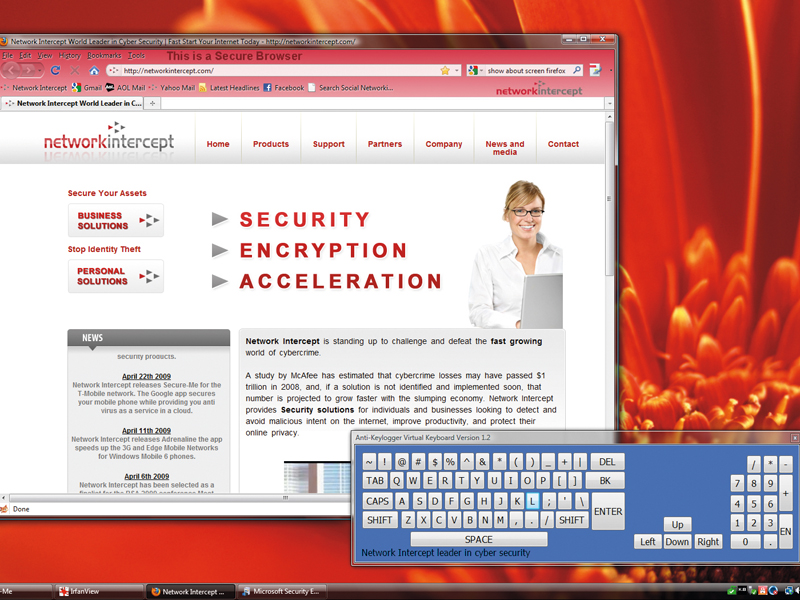TechRadar Verdict
A nice idea, but the performance and lack of transparency over whether your IP address is actually being hidden seriously count against it
Pros
- +
Decent set of features
Cons
- -
Expensive considering free alternatives
- -
Poor performance
- -
Some sites not anonymised
Why you can trust TechRadar
The internet is a dangerous place. If it isn't malware trying to intercept your keystrokes, it's fake Wi-Fi hotspots grabbing your data and logging into your online banking, or people chucking a slightly tweaked version of Firefox and a few uninspiring security programs onto a USB key and charging you nearly £90 for it. Oh, hang on: that last one's supposed to be the solution to your troubles.
Secure-Me is a 'managed security service' that will set you back £40 per year, or £90 in the first year if you want it on a low-capacity USB key.
It runs on XP, Vista and Windows 7, and the manufacturers say the USB version works on Mac OS X too.
The main focus of Secure-Me is on private web browsing, and it goes beyond the private browsing modes that you'll find in all the popular browsers, including Firefox, Internet Explorer, Safari and Chrome. Its modified Firefox browser is routed through an IP anonymiser to hide your real IP address, and all traffic is encrypted to prevent others from peeking at what you're doing.
You don't have to use the supplied version of Firefox if you don't want to, as it also works in Internet Explorer.
There are two other browser based features of note. Secure-Me boasts "a patent-pending hardware/ software compression algorithm" that promises up to three times faster browsing and downloading. There's also a Keystroke Interference feature, which broadcasts extra characters – visible in the bottom corner of the screen – when you fill out online forms, in order to confuse any keystroke loggers that might be lurking on your system.
As well as these features, Secure-Me has a virtual keyboard that you can use to further reduce the threat of keyloggers – it allows you to enter passwords without touching a physical keyboard. It works in any Windows program – although other than the browser and perhaps a chat application, we're not entirely sure what other applications you might want to use it with.
To round things off, there's malware and virus scanning, plus a file encryption utility.
Private investigations
It's all very clever in theory, but unfortunately Secure-Me tends to fall down in practice. The IP spoofing isn't universal – for example, the BBC site still receives your real address so that you can watch TV programmes on the iPlayer. The fact that some sites are unblocked will be a deal breaker for the completely paranoid.
Malware scanning and virus scanning is on-demand rather than memory resident, which means that trouble can still sneak through. Because the scans are cloud-based, there's no way to tell how up-to-date the malware definition files are.
We found the browser very crash-prone too. The promised web acceleration didn't materialise, either. In fact, it was quite the reverse: rather than speeding up our browsing, Secure-Me felt like we'd swapped our broadband for dial-up. Simple searches were desperately slow, web pages with third-party content such as advertising took an eternity to load, and our download speeds dropped dramatically.
Downloading from Microsoft.com across an uncongested wireless network, our speeds dropped from just over 1Mbps to under 400Kbps when we tried the same files with Secure-Me.
Money for nothing
Secure-Me is up against two big problems. The first is that it's possible to get most of its features for free, and in many cases, the free versions are better.
The Opera browser has server-side compression, Microsoft Security Essentials has memory-resident protection, the web is packed with free and fast IP anonymisers, programs such as TrueCrypt offer free and effective encryption, and so on.
You don't get the keylogger protection, but most security software will find such malware. In any case, the chances of someone sticking a hardware keylogger on your PC are pretty slim.
The second problem, though, is that very few people will need all or even some of these features. If you just want to surf, shop and bank safely online, all you need to do is keep your browser and security software up to date and look at the web with a sceptical eye.
Follow TechRadar Reviews on Twitter: http://twitter.com/techradarreview
